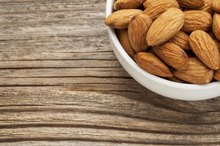Tips to Boost Protein to Donate Plasma
Plasma donating requires you to maintain a high level of protein to avoid negatively affecting your health. On average, you should consume 50 to 80 grams of protein daily. Mypyramid.gov recommends that adults eat 5 to 6.5 equivalent oz. of meat, fish, beans or eggs per day, as well as three servings of dairy. These combined servings provide the majority of the protein you need prior to undergoing plasma apheresis.
Lean Meat
Lean meat can increase your blood protein levels without causing any issues with your health. White lean meats such as chicken, pork and turkey provide protein and iron without dramatically increasing cholesterol. You should eat beef in smaller quantities because it is difficult to digest. The average serving of meat (approximately 3.5 oz.) contains about 25 grams of protein. The US Department of Agriculture recommends removing visible fat from any meat you cook, as well as choosing lean options in prepared foods such as lunch meat.
Seafood
Cholesterol & Seafood
Learn More
Seafood often provides a wonderful source of healthy lean protein. Fish contain as much as 21 grams of protein per 3.5 oz. serving. The Harvard School of Public Health explains that a six oz. serving of salmon provides 34 grams of protein. Seafood also provides Omega-3 fatty acids, which offer a host of other health benefits. Be wary of high cholesterol shellfish options such as shrimp, however.
Eggs and Dairy
Individual eggs contain an average of six grams of protein. Harvard Health Publications cautions that eggs contain 212 mg of cholesterol per serving, but since they can't find a study linking consumption of eggs to heart disease, they recommend eating just one whole egg per day. Reduced fat milk and yogurt average six grams of protein per serving. According to the weight loss for all website, cheddar cheese may contain as much as 25 grams of protein per 3.5 oz. One oz., however, is the typical cheese serving. Soy milk provides a protein-rich alternative to animal milk, since it contains six grams of protein per eight oz. serving.
Nuts, Beans and Vegetables
What Are the Benefits of Quail Eggs?
Learn More
Nuts provide a healthy source of protein, as well as dietary fiber and other nutrients your body needs. Seed and nut servings normally equal a quarter cup. Two oz. of almonds contains eight grams of protein, as do two tbsp. of peanut butter. Sunflower seeds contain six grams per quarter cup, whereas cashews and almond butter each have have five grams of protein per serving.
Choose beans over nuts whenever possible, as they pack more protein and less fat. Soybeans contain as much as 29 grams per cup, followed by lentils at 18, black beans at 15, and pinto beans at 12 grams of protein per serving.
Weigh your vegetable portions, since they provide sizable amounts of protein when consumed in appropriate quantities. Peas contain nine grams of protein per cup, while a cup of spinach offers five. One cup of broccoli and a six oz. baked potato both contain four grams of protein.
Tips for Plasma Aphresis
No matter how high your protein levels, your plasma appears milky in color when you consume too much fat or cholesterol. Choose lean protein over fatty choices such as hamburgers and fried foods.
Make sure you eat before your plasma donation and stay hydrated. If you skip several meals leading up to your donation, your levels may not be high enough to donate. Biolife Plasma Services recommends eating within at least three hours of donating.
Related Articles
References
- BioLife Plasma Services: Health and Nutrition Tips
- My Pyramid: Inside The Pyramid
- Harvard School of Public Health: Protein- Moving Closer to Center Stage
- The Vegetarian Resource Group: Protein in the Vegan Diet
- Harvard Health Publications: Egg Nutrition and Heart Disease : Eggs Aren't The Dietary Demons They're Cracked Up To Be
Resources









